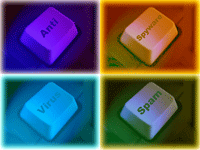Virus Prevention
What is a virus?
A virus is a computer program which is designed to duplicate itself and spread through computer systems and networks. Viruses come in various guises such as the Trojan horse virus, which essentially hides itself within another program and cleverly spreads itself in the background whilst you are running the main program. A worm, on the other hand can replicate without human intervention and takes control of network programs such as email clients to spread itself onto other systems.
As with human viruses, computer viruses can range from almost harmless to downright destructive but all consume valuable system resources. The threat of computer viruses is also on the increase with one of the world leaders in security, Sophos reporting that new viruses are up 59% on last years figures.
What are the effects of viruses?
There are a wide range of effects associated with viruses and the damage they can incur can range from:
 1. Using up space on your hard drive and memory
1. Using up space on your hard drive and memory
2. Displaying annoying messages on your screen
3. Stopping antivirus and other programs from installing
4. Deleting files or reformatting you disk
5. Slowing down or crashing your computer
6. Restarting or preventing Windows restarts
7. Stopping applications performing correctly
These and other effects could also be the result of software or hardware malfunctions. However, if you experience one or more of the above problems then there is a chance you have a virus on your system.
Prevention from viruses
As well as installing a free anti-virus utility there are a few methods worth adopting in order to guard against viruses. These include:
 1. Email: do not open attachments from unknown sources especially if they have double extensions eg. text.doc.vxd
1. Email: do not open attachments from unknown sources especially if they have double extensions eg. text.doc.vxd
2. Firewall: make sure you have firewall protection when using the Internet. If you do not have a Windows firewall installed and switched on then an excellent free firewall called Zonealarm can be downloaded from http://www.zonelabs.com/
3. Downloading: be careful when downloading any unknown software, always try to use trusted and reliable sources
4. Security: use the latest security updates for your computer, they can normally be downloaded at http://windowsupdate.microsoft.com
